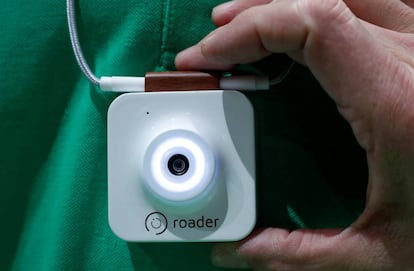Damages awarded to thieving cashiers who were secretly filmed by employer
Human rights court in Strasbourg finds Spanish supermarket violated right to privacy of staff

Five Spanish women who were secretly filmed stealing products from their workplace have been awarded €4,500 in compensation by the European Court of Human Rights (ECHR) in Strasbourg. The women launched the case after they were dismissed after being caught on hidden cameras robbing or helping other employees rob products from the supermarket where they worked as cashiers. The court ruled that while the women received a fair trial and were dismissed on fair grounds, an employer cannot secretly film their employees in the workplace.
The dispute began in June, 2009, when, concerned over the disparity between stock levels and what was actually sold, the manager of the family-owned supermarket chain M.S.A. decided to install cameras. But while she notified the workers of the visible cameras, she did not mention that hidden cameras had also been installed, meaning the workers were not aware they were being filmed.
The court ruled that an employer cannot secretly film its employees in the workplace
All workers suspected of stealing were called into individual meetings where they were shown footage of themselves helping clients and other workers to steal products, or outright stealing themselves. The five applicants Isabel López Ribalda, María de los Ángeles Gancedo Giménez, María del Carmen Ramos Busquets, Pilar Saborido Apresa and Carmen Isabel Pozo – who were locals at that time of Sant Celoni and Sant Pere de Vilamajor in Barcelona province – confessed they were involved with the thefts and were fired on disciplinary grounds.
Three of the five cashiers signed an agreement in which they acknowledged that they had a hand in stealing and promised not complain to any labor court as long as charges were not brought against them. In the end, however, they all went to court and the contents of the video were used to justify the dismissal procedures.
The Spanish justice system ruled that the dismissals were fair in various instances, including on appeal to the High Court. The women were then forced to take their case to the ECHR. They based their suit on Article 8 of the European Convention of Human Rights, claiming their “right to family and private life” was violated by the hidden cameras as was their right to a fair trial, outlined in Article 6.1.
In its judgment, the ECHR ruled, six in favor and one against, that the cameras did breach the women's right to privacy, arguing that under Spanish data protection laws, the women “should have been informed that they were being surveyed but were not.”
The domestic courts had failed to strike a fair balance between the rights involved European Court of Human Rights
The ECHR “found that the (Spanish) domestic courts had failed to strike a fair balance between the rights involved and there had been a violation of Article 8 in respect of the applicants,” according to the ruling.
Despite this, the seven judges in the López Ribalda vs Spain case rejected the cashiers’ claim that they had received an unfair trial. According to the court, there was “no reason to challenge the domestic courts’ findings that it had been possible to use the third, fourth and fifth applicants’ settlement agreements as evidence, even if they had been obtained after the video recordings had been shown to them.” It added that “the applicants had been able to challenge the authenticity of the recordings in adversarial proceedings and that the films had not been the sole evidence for the courts’ decisions.”
The Spanish women had demanded compensation for lost wages, €6,500 each for “considerable moral damage” and another €2,906.80 to cover legal costs. The ECHR refused wage compensation and reduced the non-pecuniary damage to €4,000. The first applicant López Ribalda received €500 for legal costs and expenses and rest received €568.86.
English version by Melissa Kitson.
Tu suscripción se está usando en otro dispositivo
¿Quieres añadir otro usuario a tu suscripción?
Si continúas leyendo en este dispositivo, no se podrá leer en el otro.
FlechaTu suscripción se está usando en otro dispositivo y solo puedes acceder a EL PAÍS desde un dispositivo a la vez.
Si quieres compartir tu cuenta, cambia tu suscripción a la modalidad Premium, así podrás añadir otro usuario. Cada uno accederá con su propia cuenta de email, lo que os permitirá personalizar vuestra experiencia en EL PAÍS.
¿Tienes una suscripción de empresa? Accede aquí para contratar más cuentas.
En el caso de no saber quién está usando tu cuenta, te recomendamos cambiar tu contraseña aquí.
Si decides continuar compartiendo tu cuenta, este mensaje se mostrará en tu dispositivo y en el de la otra persona que está usando tu cuenta de forma indefinida, afectando a tu experiencia de lectura. Puedes consultar aquí los términos y condiciones de la suscripción digital.









































